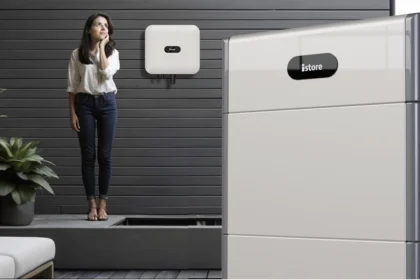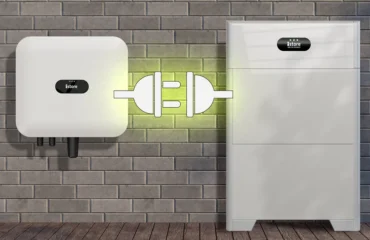
Ever wondered why your solar panels pump out all that energy during the day, but you’re still paying the power company at night? The missing piece is a solar battery.
Solar panels only generate power while the sun is shining. Without a solar battery, any unused energy gets sent back to the grid instead of being saved for when you need it, like cooking dinner or binge-watching Netflix after dark.
The big question is: “What size solar battery do I need?” Pick too small, and you’ll run out of juice. Go too big, and you’ll overspend.
Let’s look at what you should consider when buying a solar battery so you know exactly what size battery will work for your home.
Why Is Choosing the Right Solar Battery Size Important?
If your solar battery is too small, it won’t hold enough energy to cover your evening use. You’ll be left relying on grid electricity that’s expensive and generated mainly from non-renewable fossil fuels.
On the other hand, a battery that’s too large means you’ve paid for storage you rarely, if ever, fill, which is an unnecessary hit to your budget.
So how do you figure out “What size solar battery do I need for my house?” Consider the following factors.
Factors to Consider When Sizing Your Solar Battery
Daily Energy Usage
Start by calculating your home’s average daily electricity use. Knowing your usage means you can choose a solar battery that matches your energy needs.
Check your electricity bill. It usually lists your total energy use over a billing period. Divide that by the number of days to get your daily average. Alternatively, note the reading on your meter at the same time on two consecutive days, then subtract to find the kWh used in 24 hours.
For reference, here are some typical household energy usage figures:
- Small Households (1–2 people): 8–17 kWh/day
- Medium Households (3 people): 18–20 kWh/day
- Large Households (4–5+ people): 21–25 kWh/day or more
Solar Panel Capacity
Solar panels set the limit for how much energy you can produce and store each day. A larger 6–10 kW system can generate far more electricity than a smaller 3 kW system, giving you more excess energy to put into a battery.
The efficiency of your panels also matters, since higher-efficiency models produce more power from the same amount of sunlight.
Panel placement affects how efficiently your system performs. If your roof is partly shaded or panels face away from the sun, your overall output will be lower, which means the battery may not charge to full capacity. In this case, installing a large battery won’t deliver value, because the panels can’t generate enough power to fill it.
Usage Goals
Your reasons for installing a solar battery will strongly influence the size you need.
- Backup Power: If your main goal is backup power during blackouts, you may only need a smaller battery that can power essentials like lights, Wi-Fi, and the fridge. A larger battery would be necessary if you want to keep high-demand appliances, such as air conditioning, running as well.
- Off-Grid Living: If your home is not connected to the grid, you’ll need enough storage to cover all your daily energy needs, plus extra capacity for cloudy days.
- Reducing Energy Bills: If your focus is on saving money rather than complete energy independence, a mid-sized battery is often enough. It can store daytime solar energy for use in the evening, helping you avoid buying expensive grid power during peak hours.
Location and Climate
Where you live has a big impact on how much solar energy your panels can produce and how large a battery you need.
Homes in sunny regions generate more solar power, so a smaller battery may be enough to store the excess energy. Cooler or cloudier regions get fewer peak sun hours, which means you may want a larger battery to store extra energy when it’s available.
These are the average peak sun hours per day across major Australian cities:
| City | Average Peak Sun Hours per Day (Approx.) |
| Brisbane | 5.6 hours |
| Sydney | 5.3 hours |
| Melbourne | 4.7 hours |
| Tasmania | 3.5 hours |
| Adelaide | 5.3 hours |
| Perth | 6.0 hours |
| Northern Territory | 6.5 hours |
Seasonal changes also play a role. Households in southern states often use more electricity in winter for heating, while northern states may have higher summer demand from air conditioning.
Future Energy Needs
When choosing a solar battery, consider how your energy needs may grow in the future. Factoring in future changes helps you avoid needing an upgrade a few years down the track.
If you plan to have more people living under your roof, expect higher energy demand from extra appliances, heating, cooling, and day-to-day living.
If you plan to get an electric vehicle, this can significantly increase your electricity use. Charging can require 6–12 kWh per night, depending on the car and driving habits.
Common Solar Battery Sizes and Their Uses
- 5 kWh: Suited to smaller households or those wanting minimal essential power backup during power outages.
- 10 kWh: Storing enough solar power to cover evening use and reduce reliance on grid electricity.
- 15 kWh+: Ideal for larger families, homes with high-demand appliances, or those considering partial or full off-grid living.
Benefits of Modular Solar Battery Systems
Many solar batteries are modular, which means you can start small and add more capacity as your energy needs grow.
For example, iStore solar batteries come in stackable 5 kWh modules. You can connect up to six modules, giving you flexibility to scale from 5 kWh to 30 kWh of storage.
How to Calculate the Right Solar Battery Size for Your Home
Here’s a simple guide to figure out “What size solar battery do I need for my house?”
- Calculate your daily energy use. Check your electricity bill or meter to see how many kilowatt-hours (kWh) your household uses on average each day.
- Decide how much of that you want covered. Do you just want to reduce your evening bills, keep the lights and fridge on during blackouts, or aim for full coverage? Your goal will determine how much storage you need.
- Factor in your solar panel output. The size and efficiency of your solar system, along with peak sun hours in your area, affect how much energy you can generate to charge your battery.
Simple calculation:
Take your average daily energy use and multiply it by the percentage you want the battery to cover.
For example:
- Daily energy use = 20 kWh
- Desired coverage = 75% (0.75)
- 20 × 0.75 = 15 kWh battery
Still unsure? You don’t have to crunch the numbers alone! iStore’s solar battery experts can calculate the right size for your home and recommend a system that fits your budget and future energy goals.
FAQs
How Do I Know What Size Solar Battery I Need?
The right solar battery size depends on your daily energy use, how much of that you want to cover, and the output of your solar panels.
A quick way to estimate is to multiply your average daily usage (in kWh) by the percentage you want stored.
Is a 10kWh Battery Enough for My Home?
A 10 kWh battery suits most medium-sized homes, as it can store enough energy to cover typical evening use and reduce reliance on grid power. For example, a 10 kWh battery can run essentials like lights, a fridge, Wi-Fi, and a TV, plus a few hours of air conditioning or other appliances.
What Factors Affect Solar Battery Capacity?
Solar battery capacity is influenced by daily energy use, the size and efficiency of solar panels, peak sun hours, and usage goals, whether that’s backup power, bill savings, or going off-grid. Adding more people to the household or charging an EV can also affect battery size.
Can I Add More Battery Capacity to My Solar System Later? </h3>
Many modern solar batteries are modular, so you can start small and add more capacity later as your energy needs grow. Just make sure your solar system and inverter are compatible with expansion.
Find the Perfect Solar Battery Size with iStore
Still asking yourself, “What size solar battery do I need for my house?”
iStore makes the answer simple. Our modular battery systems let you start with a compact 5 kWh unit and expand all the way to 30 kWh as your household grows or your energy needs change. Each module is lightweight, stackable, and designed to fit seamlessly into Aussie homes.
Talk to an iStore expert today to find the perfect battery size for your home. Browse our solar battery range, then get in touch by calling 1300 515 640 or filling out this online form.




